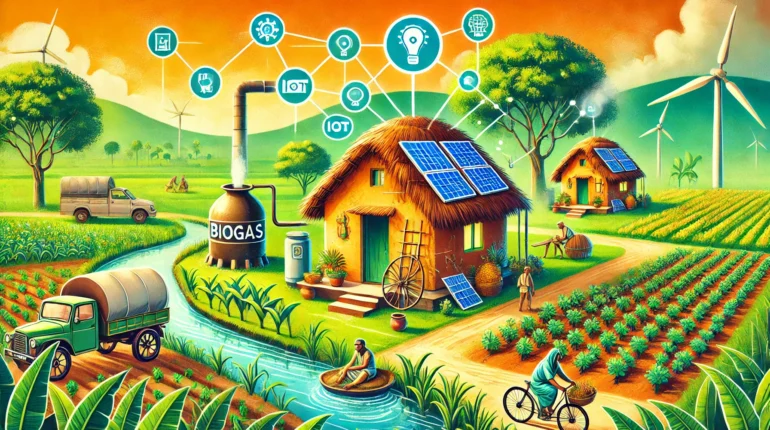
In a world grappling with climate change, resource depletion, and social inequities, the fusion of traditional wisdom with modern technology offers a promising path forward. At Vishwa Sanatan Trust (VST), we are redefining sustainability by embracing age-old practices and enhancing them with contemporary innovations. This blend of tradition and modernity is not just a bridge between the past and the future; it is a roadmap for a balanced, sustainable, and inclusive world.
Traditional Knowledge Meets Technology
Traditional practices are a treasure trove of sustainable methods, refined over centuries. At VST, we integrate these practices with cutting-edge technology to enhance efficiency and scalability. For instance, biogas production, a time-tested method for converting organic waste into energy, is now optimized using modern biogas plants equipped with advanced sensors. These sensors monitor gas production levels and ensure maximum efficiency, making the process more reliable and scalable for communities.
Similarly, organic farming, rooted in ancient agricultural practices, is being revolutionized with data analytics and Internet of Things (IoT) devices. Sensors monitor soil moisture and nutrient levels in real time, enabling precise irrigation and fertilization. This fusion reduces resource waste while boosting crop yields, ensuring food security without harming the environment.
Smart Villages: Reviving Rural India
India’s villages have long been repositories of traditional wisdom. VST envisions “Smart Villages” that combine this wisdom with modern amenities. Rainwater harvesting, a centuries-old practice, is enhanced with modern storage and filtration systems to ensure clean and sustainable water supplies. Solar-powered irrigation systems are replacing diesel pumps, reducing carbon footprints while ensuring consistent agricultural productivity.
These initiatives empower rural communities, fostering self-sufficiency and economic resilience. Smart Villages demonstrate that rural areas can thrive sustainably without abandoning their cultural and traditional roots.
Sustainable Architecture: Lessons from the Past
Traditional architecture is inherently sustainable, relying on locally sourced materials and designs suited to the natural climate. At VST, we draw inspiration from practices like mud houses and stone masonry. These designs are being modernized with recycled materials, green roofs, and energy-efficient technologies.
For example, integrating solar panels and passive cooling techniques into traditional designs creates homes that are not only eco-friendly but also comfortable and cost-effective. These structures embody the philosophy of “simple living, high thinking,” offering solutions that respect both the environment and human needs.
Eco-Friendly Mobility Inspired by Nature
Transportation is a significant contributor to greenhouse gas emissions. VST is exploring biogas-powered vehicles, a concept inspired by traditional methods of harnessing natural energy sources. Research and development efforts aim to make these vehicles practical and accessible, especially for rural and semi-urban areas.
Additionally, we look to nature for innovative designs, such as aerodynamic structures inspired by birds and animals, to create fuel-efficient and environmentally friendly vehicles. This approach marries the creativity of tradition with the precision of modern engineering.
The Role of AI and Machine Learning in Revitalizing Traditions
Artificial Intelligence (AI) and Machine Learning (ML) are proving invaluable in preserving and optimizing traditional practices. AI-driven platforms analyze historical data to refine traditional farming methods, recommending optimal planting schedules and resource management techniques.
Machine learning algorithms are also helping artisans and craftsmen by identifying global markets for their traditional products. These technologies ensure that age-old skills remain relevant and profitable in the modern economy.
Cultural and Social Integration
Traditional art, crafts, and storytelling are powerful tools for preserving heritage and promoting sustainability. VST supports local artisans by providing digital platforms to showcase their work globally. This not only sustains traditional crafts but also offers a livelihood to marginalized communities.
Moreover, VST champions the social inclusion of the transgender community by integrating them into these initiatives. Through education and employment opportunities, we challenge stereotypes and create a more equitable society. This harmonious integration of cultural preservation and social empowerment exemplifies our mission to promote humanity, not religion.
Conclusion
The synergy between tradition and innovation holds the key to a sustainable and equitable future. By leveraging the best of both worlds, Vishwa Sanatan Trust is pioneering solutions that are rooted in history yet tailored for modern challenges.
We invite you to join us in this transformative journey. Whether through adopting sustainable practices, supporting our initiatives, or simply spreading awareness, every action contributes to a brighter, greener future. Together, we can prove that the wisdom of the past, when paired with the ingenuity of the present, can create a world where humanity and nature thrive in harmony.
